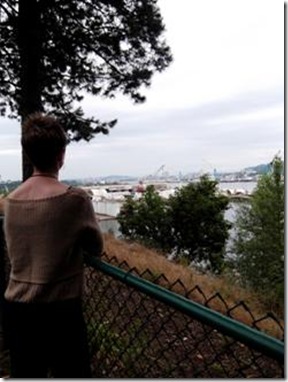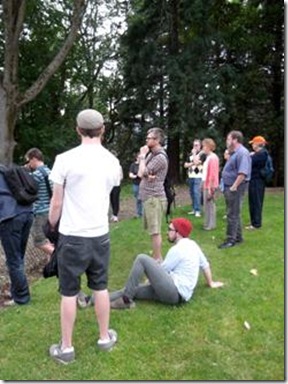Participating in the River’s Lament
by Minda Jerde, EcoFaith Recovery Communications Intern
Making the commute from Beaverton to the University of Portland Campus, I wasn’t quite sure what to expect of the River’s Lament. Working as Communications Intern for EcoFaith Recovery this summer my internship supervisor invited me to come participate in the event to take pictures and talk to people about their experiences. Living in the Portland-Beaverton area, it seems like environmental issues are on the forefront of people’s minds. Whether it means carrying your canvas bag to the grocery store instead of using the less earth-friendly plastic alternative, learning the latest way to recycle and compost your waste at local businesses and stores, keeping roads safer for Portland’s expanding community of cycling enthusiasts, or simply turning on your TV to watch the local news, the Northwest seems to be acutely aware of the environment’s maladies. This is an aspect of our community that is not hidden from the rest of the nation, with TV shows like Portlandia that highlight this city’s most stereotypical eccentricities, including our “obsession” with sustainability, gaining wide popularity and acclaim.
As it turns out, although the Northwest does and knows quite a bit about protecting the environment, there are still complex and painful sides of the struggle to maintain our planet that require our attention. Many people understand that we need to learn to be more sustainable, but even more people don’t fully comprehend the extent of the damage done to our communities and how we can help them. To me, this was what the River’s Lament showed me.
The River’ Lament offers an experience that is totally unique to any other “green†event I have attended. Walking around the natural environment of the Willamette River while listening to its painful story about neglect and sickness offered a deeply personal and tactile testimony of the effects of our unsustainable and toxic lifestyles. The Willamette River, which existed in its natural state for centuries, suddenly is unrecognizable to the planet it emerged from, altered to suit the preferences of the inhabitants surrounding it and then abandoned to be filled with toxic chemicals and human waste.
The River’s Lament also increased my understanding of the emerging and complex intersection between the economy and the environment and what this means for our communities. Despite Portland’s commitment to sustainable living, it is humbling to learn that many people in this area do not know about the toxic ecosystem that lives in our backyard and what it used to be.
Do not expect to leave the event completely downhearted; there is an enlightening debriefing discussion to help you decompress after the journey. During the discussion I was reminded of my study abroad experience in Oaxaca, Mexico, where my classmates and I learned how American consumerism had tangible impacts on the natural environments of the Mexican people. Little did I know that the multiple pairs of jeans I own are manufactured using frighteningly unsustainable methods. The highly toxic dyes used to give jeans a fashionable hue not only affect the health of the poor employees at the plants but also find their way into the waters that even poorer indigenous communities thrive on, sickening the people and ruining crops and livelihoods. Just as these dyes seep their way into every organic habitat that Mexico has known, American consumerist culture has also changed the way we relate to each other, our food, and our planet. So Northwesterners, take a deep breath and join us for our next River’s Lament event. We all have a lot of learning to do.


